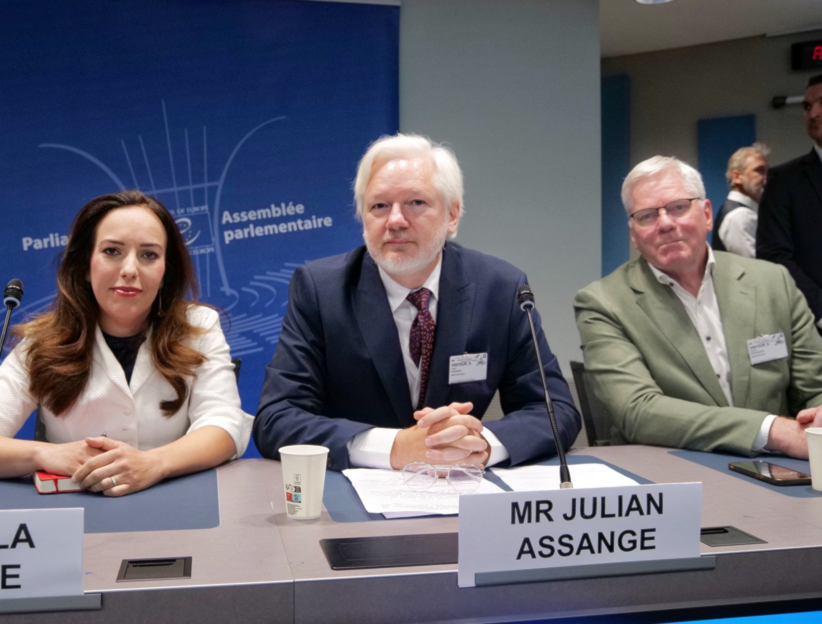Julian Assange to European lawmakers: 'I pleaded guilty to journalism'
During his first public remarks since his release, Julian Assange has addressed the Council of Europe rights body at its Strasbourg headquarters.
-

Julian Assange testifies before a parliamentary legal committee investigating his case on October 1, 2024. (@wikileaks / X)
WikiLeaks founder Julian Assange stated on Tuesday that he was released after years of imprisonment because he had pleaded guilty to “doing journalism", which he called a cornerstone of a free society.
Dressed in a black suit and a burgundy tie, with a faint white beard, Assange sat between his wife, Stella, and WikiLeaks' editor, Kristinn Hrafnsson, as he read his opening remarks from a stack of papers.
"I am yet not fully equipped to speak about what I have endured," he stated, further adding, "Isolation has taken its toll, which I am trying to unwind."
Assange traveled from Australia to Strasbourg on October 1 to testify before a parliamentary legal committee investigating his case.
Assange was released from a British prison in June after serving time for publishing hundreds of thousands of classified US government documents in 2010. This collection included candid US State Department assessments of foreign leaders, details of extrajudicial killings, and intelligence gathering on allies.
For most of the last 14 years, Assange lived in the Ecuadorian embassy in London to avoid arrest, before being held at Belmarsh Prison. Supporters view him as a champion of free speech and investigative journalism, stressing that he was persecuted and unjustly imprisoned.
Assange was released on June 25 and returned to Australia after pleading guilty to one count of conspiracy to obtain and disseminate national defense information.
Since then, he has remained largely silent about his legal issues and time in prison, making few public appearances aside from a court appearance in the Marianas Islands and a reunion with his wife at a Canberra airport.
'I pleaded guilty to journalism'
Assange told the Council of Europe rights body during his first public comments since his release, held at its Strasbourg headquarters, "I am not free today because the system worked. I am free today after years of incarceration because I pleaded guilty to journalism."
He remarked, "I eventually chose freedom over unrealizable justice... justice for me is now precluded," highlighting that he had faced a potential 175-year prison sentence.
Speaking calmly and accompanied by his wife Stella, who campaigned for his release, Assange emphasized, "Journalism is not a crime; it is a pillar of a free and informed society."
"I want to be totally clear. I am not free today because the system worked. I am free today because after years of incarceration I pleaded guilty to journalism. I pleaded guilty to seeking information from a source" - Julian Assange, Council of Europe pic.twitter.com/HSaOAqDz2P
— Sumit (@SumitHansd) October 1, 2024
He stressed, "The fundamental issue is simple. Journalists should not be prosecuted for doing their jobs."
The cache of confidential documents released by WikiLeaks contained candid US State Department assessments of foreign leaders, reports of extrajudicial killings, and intelligence operations against allies.
Assange argued that his case sheds light on "how powerful intelligence organizations engage in transnational repression" against their adversaries, warning that this "cannot become the norm here."
'Ground has been lost'
During his remarks, Assange expressed concern that while he was incarcerated, significant setbacks had occurred. "Ground has been lost," he stated, lamenting that he now observes "more impunity, more secrecy, and more retaliation for telling the truth."
He further warned that "freedom of expression and all that flows from it is at a dark crossroads," as he addressed the legal committee of the Parliamentary Assembly of the Council of Europe (PACE).
Assange called on those present to take a stand for freedom, urging, "Let us all commit to doing our part to ensure the light of freedom never dims, the pursuit of truth will live on, and the voices of many are not silenced by the interests of the few."
His case remains a source of heated debate. Supporters view him as a defender of free speech who has been unjustly persecuted and imprisoned, while critics argue that his unfiltered release of highly sensitive documents put lives at risk and compromised US security.
It is noteworthy that US President Joe Biden, who has referred to Assange as a "terrorist", may issue pardons before leaving office next January. Assange, still seeking a presidential pardon for his conviction under the Espionage Act, has chosen an interesting platform for his statements, with some observers questioning his timing and venue. The Council of Europe, comprising 46 signatories to the European Convention on Human Rights, holds little sway over Assange's legal future.

 4 Min Read
4 Min Read








